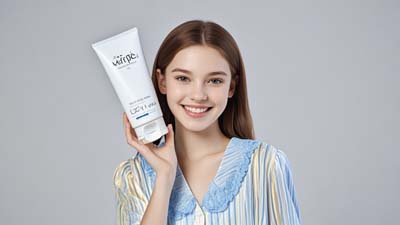
“美 (Měi) Beauty” is not an absolute, inflexible concept. There are differences between the understanding and pursuit of beauty between the East and the West. For Chinese, among many standards of beauty, fair skin is a rather important “标准 (biāozhǔn) criterion” to judge “外貌 (wàimào) appearances,” and how to whiten is also a daily life topic, especially for women.
While I was studying in Europe I encountered all sorts of differences between Western and Eastern Culture. I became very familiar with the feeling of culture shock, and I hope that by sharing my story, I am able to open your awareness about some of the cultural differences around the world.
My good friend Lisa and I were chatting one day, and she happily said to me that she finally getting darker. She spent the whole summer vacation “晒黑 (shài hēi) tanning.” She was afraid that after a little while, she would immediately go back to being white, so she went to the tanning salon regularly to keep her beautiful tan from fading.
On the opposite end of the spectrum, many Chinese girls often complain that they can’t get white enough, and are willing to try every means possible to make themselves a little whiter. That’s why “美白产品 (měi bái chǎnpǐn) whitening products” are more and more popular on the Chinese market.
For western countries, pursuing dark skin can date back to ancient times, because in former European and American countries, only the rich could go head seaside on holidays, and the poor were the ones who had to work, usually indoors like in factories, day and night. Over time, the gap between the rich and the poor has widened. It also gradually developed a “习惯 (xíguàn) habit” of distinguishing social status by the “肤色 (fūsè) the color of skin.”
In the East, though, Asians love whitening so much for exactly the opposite reasoning. In ancient China, only the rich could enjoy themselves at home, and the poor went out in the fields to do manual labor. Therefore, the white “皮肤 (pífū) skin” was not only a status symbol, but also gave rise to the aesthetic standards at that time. ”
The beautifying through whitening culture is deeply rooted in China’s history. That is also the reason why “白富美 (bái fù měi) white, rich, and beautiful,” has become a new “目标 (mùbiāo) goal” of many modern Chinese women.
(Do You Know What the Corresponding Phrase of “白富美 (Bái fù měi) Is in China?”)
Chinese prefer big eyes while westerners sometimes prefer more Asian-looking, small eyes.
Chinese prefer an oval and thin-shaped face while westerners prefer a wider, more athletic face shape.
Chinese tend to prefer slimmer body-types while westerners prefer a more athletic or curvy body.
Chinese have a specific and limited “one type” idea of beauty while westerners like more colors, races, styles, and sizes.
There are many other examples of the differences between western culture and eastern culture. We’d love to know what you’ve encountered on your exploration of new cultures. Leave us a comment and let us know what culture shocks you might have experienced!
1. 美 (Měi): beauty
2. 标准 (Biāozhǔn): standard, criterion, benchmark
3. 外貌 (Wàimào): appearance, exterior, looks, aspect, color
4. 晒黑 (Shài hēi): tan, brown, suntan
(What on Earth Can We “晒 (shài)?”)
5. 美白产品 (Měi bái chǎnpǐn): whitening products
6. 习惯 (Xíguàn): be accustomed to, be used to, habit, custom, practice
7. 肤色 (Fūsè): the color of skin, complexion
8. 目标 (Mùbiāo): goal, target, objective, aim, cause
The following are some common phrases you might hear when talking about skin:
Tā de pífū hěn bái.
她的皮肤很白。
She has very fair skin.
Yóuyú chángqī zài hùwài yùndòng, tā de pífū dōu shài hēi la.
由于长期在户外运动,他的皮肤都晒黑啦.
He’s so tan because of how much time he spends exercising outside.
Yàzhōu guójiā dà duō yǐ bái wéi měi.
亚洲国家大多以白为美。
Most Asian countries regard white as being beautiful.

Read the dialogue and answer the question below:
Xiǎo Xīn: Āi, wǒ zuìjìn yòu shài hēi la.
小新: 哎,我最近又晒黑啦。
Xiǎo Míng: Tǐng hǎo de ya, xiǎomài sè de pífū kàn shàngqù hěn jiànkāng.
小明: 挺好的呀,小麦色的皮肤看上去很健康。
What does Xiao Ming mean? Please choose the best answer.
A. Xiao Ming wants to get whiter.
B. Xiao Ming wants to be even tanner.
C. Xiao Ming prefers a healthy complexion.
D. Xiao Ming tanned recently.
Top 7 Taboos in China (Beginner)
4 Must-Know Facts of Daily Life in China!
Top 10 Mandarin Chinese Expressions Women Hate to Hear!
Chinese Culture
HSK Test
General Chinese (Beginner Level)
General Chinese (Intermediate Level)



